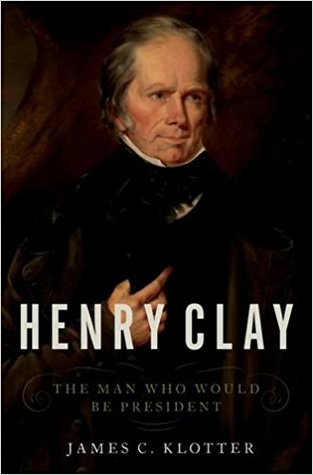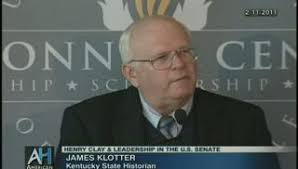GoodReads meta-data is 536 pages, rated 4.24 by seventeen raters.
Genre: biography, presidents, leadership.

Verdict: One of the best president that never was.
‘I’d rather be right than president,’ quoth Harry Clay (1777-1852), and he was right. Compromise was possible and, more importantly, it was preferable to conflict.
Clay was that rarity in the Nineteenth Century, a full time professional politician who did little else but politics. Yes, he had a law practice and occasionally he took cases, and yes he had a farm in Kentucky that prospered, but neither of these latter interested him, whereas politics consumed him. Like Cicero, like FDR, like Clemenceau, he found the zoo of politics all-consuming.
His finest hours were undoubtedly in the House of Representatives where as Speaker he was instrumental in averting several crises by finding the common ground among conflicting parties, mostly about slavery, states rights, and tariffs. He never supposed a problem was intractable, nor that fighting it out was best. He combined, per this biography, spell-binding oratory when that was required, with the patience of Job in cajoling, coaxing, inching toward a paper thin agreement that would stave off the crise de jour, always in the hope that the fire-eaters would cool off for a time. As they cooled, another compromise might be possible, and so on and on without end. As he never supposed a problem was intractable he also never supposed problems could be made to disappear — poof! — but rather they could be managed. The Missouri Compromise, the admission of Texas to the Union, the Compromise of 1850, the Tariff of 1833 that quelled the nullification crisis, and numerous other less well known measures all bore his fingerprints.
Many obituary writers on his death feared the worst and they were right. Without Henry Clay to find the way of peace, the way would be to war, and it was.
The oratory was at the stump in the long-winded speeches typical of the day, and the book gives little sense of these, but we may be sure they were studded with references to American history and the Bible. Clay was not, and did not pretend to be, religious. Only late in life did he become a member of a church. He did attend churches services now and again but that seems to have been more social than devotional. This indifference was often attacked by opponents without being decisive.
The cajoling and coaxing was often done in private over a glass of whiskey and a cigar. He managed to keep personal relations with some of his most direct opponents like Martin van Buren. They would slug it out at the dais of a public meeting, and then retire to Clay’s hotel room for a drink and a bragging contest about children and then grandchildren. Like many others he found it impossible to maintain a personal relationship with Andrew Jackson. But then neither could Jackson’s creature Van Buren.
Clay was a centrist and that never appealed to the ultras of the continua. He wanted slavery to end and proposed measures that would — in time, a lot of time — lead to that abolition, maybe. That displeased both the slavers and the abolitionists. He wanted industrial development but not a tariff that penalised agriculture, including cotton. That displeased the free traders who wanted no tariff and the protectionists who wanted a high tariff.
As a centrist what he wanted most of all was union and stability. To get that Hobbesian compromises had to be made. It is in that context that he said ‘I’d rather be right than [be] president.’ He was right, a compromise on that occasion was reached and it held for a decade, a long time in politics.
The list of offices he held on Wikipedia is exhausting but not exhaustive because it does not include his service in the Kentucky state legislature.
US Senator, 1849-1852, 1831-1842, 1810-1811, and 1806-1807.
Secretary of State, 1825-1829. Speaker of the House of Representatives 1823-1825, 1815-1820, 1811-1814. Member of House of Representatives from Kentucky 1823-1825, 1815-1821, 1811-1814.
In addition to these offices in 1814 he was also a commissioner to negotiate the Treaty of Ghent with Great Britain to end the War of 1812, where he is credited with driving a hard bargain.
His presidential campaigns as a Whig are these:
1824 lost to JQ Adams in a four-way contest who defeated (General) Jackson
1832 lost to (General) Andrew Jackson
1840 Sought but did not get nomination – (General) Henry Harrison did
1844 Lost to James K Polk as stand-in for (General) Jackson
1848 Sought but did not get nomination – (General) Zachery Taylor did
Even in death his influence continued in his search for compromise and his firm commitment to Union embodied most notably in his one-time fellow Whig smf Kentuckian, Abraham Lincoln, who expressed admiration for Clay throughout his own presidency.
There is a superb last chapter that I wish all biographers would imitate. It reviews Clay’s career and life, enumerates his achievements, assesses them, and puts that in the context of what followed, and ended with the heritage he left.
The author notes the domination of military men in presidential politics at the time with some counting and quantifying that surprised me. See the parenthetical references to Generals in the list above of presidential races. Point taken. Against that background Clay’s accomplishments seem even more admirable.

James Klotter is Kentucky State historian with a long list of publications on the Blue Grass State from whence came my father.
I listened to it on Audible, and found the reading difficult to bear. The narrator affected a breathless staccato delivery that exhausted this listener in about fifteen minutes. My listening was episodic.
